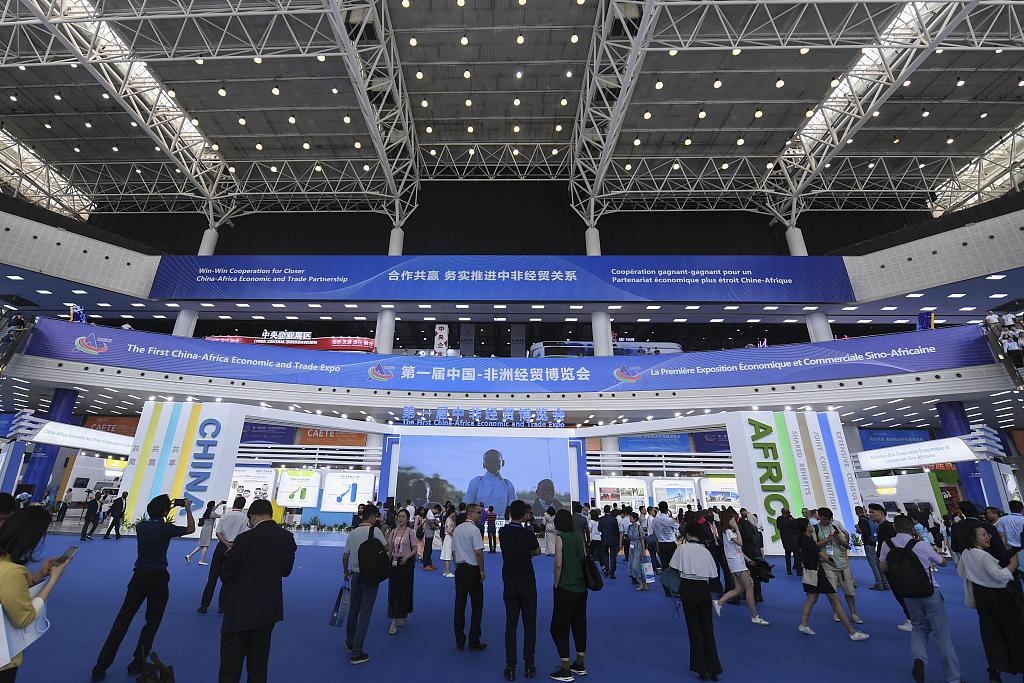Agricultural cooperation between China and Africa is set to see a rapid growth, judging by the expressions of interest and deals signed between the two sides at the recently-held China-Africa Economic and Trade Expo in Changsha.

The first China-Africa Economic and Trade Expo in Changsha, Hunan province. (Photo/VCG)
Deals for eight agricultural projects worth $2.747 billion were signed at the expo along with proposals to strengthen South-South and Triangular Cooperation raised by seven organizations, including the China International Center for Economic and Technical Exchanges, the China National Hybrid Rice R&D Center, and the African Union.
The expo follows the eight initiatives unveiled at the 2018 Beijing Summit of the Forum on China-Africa Cooperation to boost trade and investment between the two regions.
Ma Youxiang, head of livestock production at the Ministry of Agriculture and Rural Affairs, said China has been offering tech and financial support to Africa's development of agriculture, and has made several significant achievements.
"Going forward, China and Africa will see compelling opportunities for cooperation in the agricultural sector, with policy and cooperation mechanisms, agricultural trade and investment, technical cooperation, and intellectual support (training and education) being the focus areas," Ma said.
Agriculture has been a major area of cooperation between China and African countries. To date, China has signed memorandums of understanding, or protocols in the agricultural sector with 21 African countries and made investments of over $2.12 billion. China's agricultural projects in Africa have created more than 20,000 jobs and offered technical guidance to over 100,000 local farmers.
Ma Guohui, deputy director at the China National Hybrid Rice R&D Center, said the center has set up hybrid rice trial programs in many African countries like Madagascar and Liberia, and has been offering technical support to local staff.
"China's hybrid rice research is leading the world and has made significant contributions in easing Africa's food shortage problems. Compared with conventional rice, hybrid rice has obvious advantages in production. In China, grain output from hybrid rice plantations can feed up to 80 million people," Ma said.
In May, the China National Hybrid Rice R&D Center set up a research center in Madagascar, in association with the Madagascar agriculture ministry and local companies.
"Going forward, we are eyeing more cooperation with African countries, and will try to connect with more academic organizations and companies. We will also work to develop new kinds of hybrid rice that are suitable for African countries and offer technical training to more local staff," Ma said.
Fadel Ndiame, vice-president of the Alliance for a Green Revolution in Africa, an association aiming to boost agricultural development in Africa, said the expo benefited African countries through better communication in agricultural techniques.
"(We need to) have good technologies ... to have the ecosystem, the institution extension, finance, (and) processing, to guarantee the quality of rice," Ndiame said.
"The expo gave us an insight into those experiences. It also enabled African leaders who have a plan to make concrete deals," Ndiame said.
Vincent Bamulangaki Ssempijja, Uganda's minister of agriculture, said he strongly believes that by working with China through joint venture businesses, investment arrangements and win-win cooperation, the majority of African countries can quickly eradicate poverty.
"On the wider front, Uganda has already put in place favorable investment policies that have attracted the interest of Chinese companies," the minister said.


